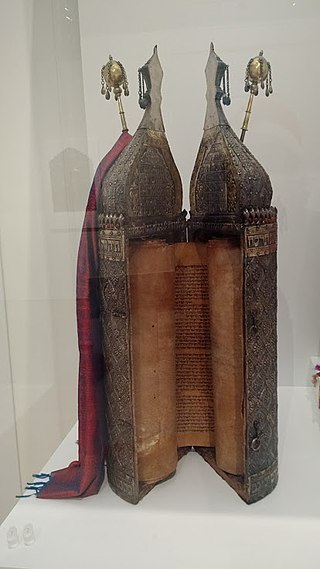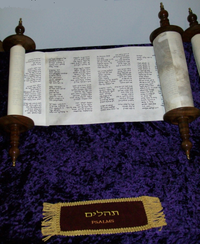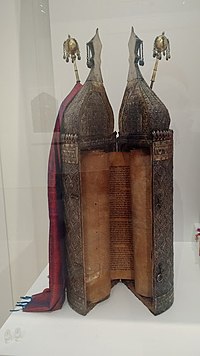
The Quran, also romanized Qur'an or Koran, is the central religious text of Islam, believed by Muslims to be a revelation from God. It is organized in 114 chapters which consist of individual verses. Besides its religious significance, it is widely regarded as the finest work in Arabic literature, and has significantly influenced the Arabic language.

Abraham was a prophet and messenger of God according to Islam, and an ancestor to the Ishmaelite Arabs and Israelites. Abraham plays a prominent role as an example of faith in Judaism, Christianity, and Islam. In Muslim belief, Abraham fulfilled all the commandments and trials wherein God nurtured him throughout his lifetime. As a result of his unwavering faith in God, Abraham was promised by God to be a leader to all the nations of the world. The Quran extols Abraham as a model, an exemplar, obedient and not an idolater. In this sense, Abraham has been described as representing "primordial man in universal surrender to the Divine Reality before its fragmentation into religions separated from each other by differences in form". Muslims believe that the Kaaba in Mecca was built by Abraham and his son Ishmael as the first house of worship on earth. The Islamic holy day 'Eid ul-Adha is celebrated in commemoration of Abraham's willingness to sacrifice his son on God's command, as well as the end of the Hajj pilgrimage to the Kaaba.
Injil is the Arabic name for the Gospel of Jesus (Isa). This Injil is described by the Qur'an as one of the four Islamic holy books which was revealed by God, the others being the Zabur, the Tawrat, and the Qur'an itself. The word Injil is also used in the Qur’an, the hadith and early Muslim documents to refer to both a book and revelations made by God to Jesus.

The Zabur is, according to Islam, the holy book of David, one of the holy books revealed by God before the Quran, alongside others such as the Tawrāh (Torah) and the Injīl (Gospel). Muslim tradition maintains that the Zabur mentioned in the Quran is the Psalms of David.

An-Nisa' is the fourth chapter (sūrah) of the Quran, with 176 verses (āyāt). The title derives from the numerous references to women throughout the chapter, including verse 34 and verses 4:127-130.

Al-An'am is the sixth chapter (sūrah) of the Quran, with 165 verses (āyāt). Coming in order in the Quran after Al-Fatiha, Al-Baqarah, Al 'Imran, An-Nisa', and Al-Ma'idah, this surah dwells on such themes as the clear signs of Allah's Dominion and Power, rejecting polytheism and unbelief, the establishment of Tawhid, the Revelation, Messengership, and Resurrection. It is a "Meccan surah", and it is believed to have been revealed in its entirety during the final year of the Meccan period of Islam. This explains the timing and contextual background of the believed revelation. The surah also reports the story of Ibrahim, who calls others to stop worshiping celestial bodies and turn towards Allah.

Al-Anbiyaʼ is the 21st chapter (sūrah) of the Quran with 112 verses (āyāt). Regarding the timing and contextual background of the believed revelation, it is an earlier "Meccan surah", which means it is believed to have been revealed in Mecca, rather than later in Medina. Its principal subject matter is prophets of the past, who also preached the same faith as Muhammad.
Iman in Islamic theology denotes a believer's recognition of faith and deeds in the religious aspects of Islam. Its most simple definition is the belief in the six articles of faith, known as arkān al-īmān.

The Tawrat, also romanized as Tawrah or Taurat, is the Arabic-language name for the Torah within its context as an Islamic holy book believed by Muslims to have been given by God to the prophets and messengers amongst the Children of Israel. In the Qur'an, the word 'Tawrat' occurs eighteen times. When referring to traditions from the Tawrat, Muslims have not only identified it with the Pentateuch, but also with the other books of the Hebrew Bible as well as with Talmudic and Midrashic writings.
Indeed, We sent down the Torah, in which was guidance and light. The prophets who submitted [to God] judged by it for the Jews, as did the rabbis and scholars by that with which they were entrusted of the Scripture of God, and they were witnesses thereto. So do not fear the people but fear Me, and do not exchange My verses for a small price [i.e., worldly gain]. And whoever does not judge by what God has revealed - then it is those who are the disbelievers.
The Scrolls of Abraham are a part of the religious scriptures of Islam. These scriptures are believed to have contained the revelations of Abraham received from the God of Abrahamic religions, which were written down by him as well as his scribes and followers.
Taḥrīf is an Arabic-language term used by Sunni and Shia Muslims to refer to believed alterations made to the previous revelations of God—specifically those that make up the Tawrat, the Zabur and the Injil. This belief has also been advocated by Quran alone Muslims. The term is also used to refer to what Muslims consider to be the corrupted Jewish and Christian interpretations of the previous revelations of God, known as “Tahrif al-Mana”. This concept holds that the previous revelations of God have been misinterpreted, as opposed to altered in text.

Religious exclusivism, or religious exclusivity, is the doctrine or belief that only one particular religion or belief system is true. This is in contrast to religious pluralism.
Dawud, or David, is considered a prophet and messenger of God (Allah) in Islam, as well as a righteous, divinely-anointed monarch of the United Kingdom of Israel. Additionally, Muslims also honor David for having received the divine revelation of the Zabur (Psalms).

In Ahmadiyya theology, the view on the Prophets of God differs significantly from Mainstream Islam. The main difference centres on the Quranic term Khatam an-Nabiyyin with reference to Muhammad which is understood by Ahmadis in terms of perfection and testification of prophethood instead of chronological finality. Accordingly, Muhammad is held to be the last prophet to deliver a religious law to humanity in the form of the Quran whose teachings embody a perfected and universal message. Although, in principle, prophets can appear within Islam but they must be non-lawbearing prophets dependent upon the sharia of Muhammad. Their prophethood is reflective of that of Muhammad, that is, within his Seal; and their role is merely that of reviving and purifying the faith. They cannot be prophets in their own right and cannot change, add to or subtract from the religious law of Islam. As such, Ahmadis, regard their founder Mirza Ghulam Ahmad (1835–1908) as a subordinate prophet who appeared as the promised Messiah and Mahdi in accordance with Islam's eschatological prophecies. In contrast to mainstream Muslims who believe Jesus was raised to heaven and one who would return himself towards the end of time, Ahmadis believe Jesus to have died a natural death and view the coming of such an independent, Israelite prophet to amount to breaking the Seal of Prophethood.
The Scrolls of Moses are an ancient body of scripture mentioned twice in the Quran, as well as in Surah Al-Aʻlā and Surah An-Najm. They are part of the religious scriptures of Islam.
The Quran states that several prior writings constitute holy books given by God to the prophets and messengers amongst the Children of Israel, in the same way the Quran was revealed to Muhammad. These include the Tawrat, believed by Muslims to have been given by God to the prophets and messengers amongst the Children of Israel, the Zabur revealed to David (Dawud); and the Injil revealed to Jesus (Isa).
Prophets in Islam are individuals in Islam who are believed to spread God's message on Earth and serve as models of ideal human behaviour. Some prophets are categorized as messengers, those who transmit divine revelation, most of them through the interaction of an angel. Muslims believe that many prophets existed, including many not mentioned in the Quran. The Quran states: "And for every community there is a messenger." Belief in the Islamic prophets is one of the six articles of the Islamic faith.
Canonized Islamic scripture are texts which Muslims believe were revealed by God through various prophets throughout humanity's history—specifically the Quran and Hadith. Muslims believe the Quran to be the final revelation of God to mankind, and a completion and confirmation of previous scriptures. It was believed to have been revealed to the Islamic prophet Muhammad from 620 CE to 632 CE, and canonized in an official, unified text during the caliphate of Rashidun Uthman, around 650 CE.












